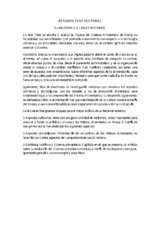Ars Cibaria: cultura y alimentación en la sociedad romana
Ars Cibaria: food and culture in roman society
Autor
Villegas Becerril, Almudena
Director/es
Melchor Gil, EnriqueEditor
Universidad de Córdoba, UCOPressFecha
2019Materia
AlimentaciónSistema alimentario
Hábitos alimentarios
Cultura alimentaria
Gastronomía
Cultura romana
Roma
Mundo Antiguo
METS:
Mostrar el registro METSPREMIS:
Mostrar el registro PREMISMetadatos
Mostrar el registro completo del ítemResumen
En esta Tesis se estudia y analiza la riqueza del Sistema Alimentario de Roma, su fecundidad, sus posibilidades, y el profundo conocimiento con respecto a la tecnología culinaria y las actividades vinculadas con esta, desde las de carácter agrícola hasta los aspectos culinarios. Asimismo, analiza la importancia que llegó a adquirir desde el punto de vista social el alimento, así como el banquete, o el sencillo acto cotidiano de compartir la comida, desde diversos puntos de vista, desde el puramente administrativo y de la organización estatal al pequeño y de carácter doméstico. Esta hipótesis comprende, por tanto, una serie de aspectos bien ensamblados, sobre diferentes aspectos de la alimentación, cada uno de los cuales pudo ser importante y necesario para que comer cada día, en Roma, no fuera un sueño, sino una necesidad bien cumplida. Igualmente, deja de manifiesto la investigación compleja que relaciona los aspectos culinarios y tecnológicos, con los sociales y los de producción alimentaria, para finalmente llegar a la comprensión del Sistema Alimentario y su desarrollo. Igualmente, se demuestra cómo la alimentación fue una manifestación de la cultura romana a través del tiempo, y que conoció modificaciones importantes vinculadas a dicha civilización. Se divide en tres grandes bloques para el mejor análisis de un tema tan extenso: 1-Aspectos culinarios: tema con una gran cantidad de vertientes, todas importantes para conocer a fondo la práctica culinaria y los hábitos alimentarios en Roma. A través de este primer eje se han analizado los siguientes aspectos: 2-Aspectos sociológicos: Presentación de un análisis de los hábitos alimentarios en relación con ciertos aspectos del comportamiento social romano. 3-Dinámica histórica y Sistema alimentario: Capítulo en el que se presenta un análisis sobre la evolución del Sistema alimentario romano a través de su desarrollo temporal, aportando para ello una cronología y unos hitos. This thesis examines and dissects the privileged Food System developing in Ancient Roman times. The evolution of the diverse means, productivity, and capabilities, that made posible to the Roman society to accumulate a significant expertise regarding among other attributes, the culinary technology and the activities associated to it, from agriculture to cooking processes, from the development of preservation techniques and methodologies, to storage, from transport to the establishment of trading routes, from the expansion of markets to the regulation of prices, to weights and measures. The work discusses the social significance bestowed to food, the banquet, and to the simple daily act of sharing food with others; from diverse angles, from the purely administrative organisation of the state, to those of small and household character. The findings of this work, address, therefore, a series of systematised food attributes deemed relevant in ascertaining that every day eating in Rome was not a dream, but a wellsatisfied need. It also outlines the complex research that associates culinary, technological and social facets, and those of food production, to finally arrive at a coherent understanding of the Roman Food System and its development over time. In addition, the thesis discusses how food was a manifestation of Roman culture through time and the significant changes this civilisation underwent due to food. The thesis is structured into three blocks that address as a common reference, the social elites food habits as well as the more mundane customs of popular sectors: 1-Culinary aspects: a topic encompassing a large number of topics, that the thesis autor deemed relevant to get an in-depth knowledge of culinary practices and eating habits in Ancient Rome. The following factors have been reviewed through this first block: 2- Sociological characters: presentation of an analysis on eating habits in relation to certain interpretations of Roman social behaviours. 3-Historical Dynamics and Food System: block that explains the evolution of the Roman Food System through time, providing a chronology and relevant milestones.

